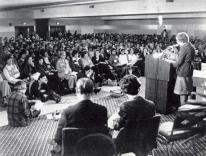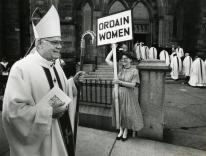The historian and classicist Garry Wills is an astonishingly prolific author whose works range from early American history to contemporary politics, and from Early Christianity to the history of the papacy and current Catholic controversies. Last year he published a book on the theology of baptism of two great Christian figures, Ambrose of Milan and Augustine, and it was wonderful. I wish I could give the same praise to his latest effort.
Why Priests? aims at deconstructing the traditional Catholic theology of the priesthood. Wills wants to eliminate priests from Catholicism, arguing that there is only one priest as such in the New Testament, Jesus Christ—and that even the scriptural designation of Christ as priest (in Hebrews) is problematic. Concerning the place of official church ministries, or offices, Wills concedes that any society must have a system of organization, and goes on to describe the secular terms that designated early Christian officials: “overseer” (episkopos), “elder” (presbyteros), and “agent” (diakonos). Most reputable scholars acknowledge that these functions only gradually morphed into what we know as bishops, priests, and deacons, and that the attribution of priestly or sacerdotal terminology to the priesthood was a slow process, taking hold only in the third and fourth centuries. The narrowing of the idea of the priesthood to the cultic—and especially to the specific power to consecrate the Eucharist—begins in the second millennium, as Edward Kilmartin, whose work Wills employs, pointed out in any number of studies.
At the heart of Wills’s argument is the relation between the priest and Eucharist. Aggressively, he sets out to “consider the claim that has set priests apart from all other human beings, their unique power to change bread and wine into the body and blood of Christ.” He jousts at an outdated model of the priesthood: men who smelled of soap and aftershave, whose hands never saw manual labor, who drove a nice (black) car, whose preserve was the sanctuary (where they were attended by young boys), and who lived in mysterious and isolated splendor. (Perhaps Wills hasn’t noticed, but wherever that world once existed it is now long gone.) The core of this book, however, is taken up with the Letter to the Hebrews, which Wills views as the chief culprit for the errors and excesses of the “failed” priestly tradition.
Wills regards Hebrews as an illogical mishmash of early Christian rhetorical wizardry. In his reading, Hebrews reverses the anticult, antipriesthood, antisacrificial trend of the rest of the New Testament. Wills faults its writer for all sorts of inconsistencies, such as the need for heaven to be purified by greater sacrifices than those offered in the earthly sanctuary (Heb 9:23). He argues that Hebrews reintroduces priesthood into a Christianity that had abandoned it a generation earlier. This helps him make the further claim that medieval atonement theology, particularly in Anselm of Canterbury’s satisfaction theory, completes a system that enables ordained priests alone to offer the sacrifice of Jesus. “Anselm’s theory,” he writes,
was just a spelling out of the consequences of the Letter to Hebrews. In combination they turned a religion that was originally priestless into one that requires priests at every stage of one’s life (at least in the Catholic and Orthodox branches of that religion), from birth to death, from baptism to last rites, with penance and Eucharist dispensed along the way.
This is, to say the least, a vast overstatement. (Wills also misreads the medieval theology of eucharistic presence in Ratramnus, Berengar of Tours, and Guibert of Nogent as merely “subjective,” when in fact these theologians were striving for eucharistic realism in the face of a crude and “magical” physicalism—as was Aquinas, with his shrewd and sophisticated theology of transubstantiation.)
Admittedly, Hebrews is a rather strange book. Its author makes Jesus a descendent of the mysterious figure from Genesis who is called “a priest forever” in Psalm 110:4, and this move enables Hebrews to treat Jesus as a priest who transcends the Aaronic priesthood. Yet I think there is another way to look at the issue of Hebrews and the priesthood. In my view, Hebrews does not so much reintroduce the Jewish priesthood as transform it radically by insisting that Jesus is the only priest (in varying degrees all Catholics participate in that one priesthood by virtue of their baptism). The problem Wills is most concerned with does not originate with Hebrews, but rather with the later tradition.
Why Priests? left me with numerous other complaints. In its closing section, “Monopoly on the Sacred,” Wills offers a terribly sloppy review of the sacraments. For example, he confuses the role of the priest as defined by the Eucharistic Prayer with the priest’s somewhat different role in the performance of baptisms and absolution. He also has tendentious things to say about the annulment process, the restriction of the power to absolve sin to priests, and the refusal to baptize someone who has not chosen, or been given, a saint’s name.
The book’s final chapter deals more extensively with the Eucharist. Here Wills relies on recent scholarship showing that what we know as the Eucharist has many different roots in the New Testament: miraculous feedings, table fellowship, post-Resurrection meals, and of course the Last Supper. He correctly points out that a number of early descriptions of the Eucharist lack what is commonly called “the consecration,” or words of institution. The main text he cites is the late-first- or early-second-century Didache, a kind of primitive Christian how-to manual. What Wills misses, however, is that the early Christian texts spiritualized the notion of sacrifice in the manner of Romans 12:1–2: “offer yourselves as a spiritual sacrifice.” He further insists that the earliest Christian meals were essentially joyful celebrations of eschatological expectation. While such expectation was clearly an element in those liturgies, it arguably coexisted with a theology that related the Eucharist to Jesus’ death. The two are not mutually exclusive. Finally, Wills comes to the conclusion (along with the liturgical scholar Paul Bradshaw) that Jesus did not “institute” the Eucharist at the Last Supper. That could be the case, but would that invalidate the tradition’s use of the scene to interpret how Christians would partake of Jesus’ life, death, and mission? To assume this is to fall prey to historicist literalism.
In my view, Why Priests? commits a fundamental error. Catholic teaching grounds the ordained ministry and ultimately the constitution of the church on Jesus’ choice of the Twelve, not specifically on a reading of the Letter to the Hebrews, however influential that document might have been later on. Furthermore, in his preoccupation with the cultic function of priests vis-à-vis the Eucharist, Wills neglects the theological strides made in the Second Vatican Council’s documents on the church and on the ministerial priesthood. The council abandoned any exclusive focus on the cultic aspects of ordained ministry in favor of a much more balanced approach stressing the priest’s participation in the threefold office of Christ: priest, prophet, and king. To be sure, the reform of the church initiated by Vatican II is in peril today, and the council’s documents were only a step in the right direction, but Wills’s écrasez l’infâme approach will not help shape a healthy contemporary Catholicism. In this regard he might have done well to consult more evenhanded treatments of these questions, such as Avery Dulles’s The Priestly Office (1997) or Daniel Donovan’s What Are They Saying About the Ministerial Priesthood? (1992).
Why Priests? is misguided and anachronistic in one other way. Wills reads the New Testament as fundamentally egalitarian; and while that may sit well with our contemporary sense of how people ought to relate to one another, it is not entirely true to the evidence. For instance, one cannot blithely oppose the charismatic to the hierarchical in the way Wills often does. For the Pauline writer of Ephesians there is a kind of pecking order among church offices: apostles, prophets, evangelists, pastors, and teachers (Eph 4:11). And, as Wills acknowledges, the New Testament itself recognizes some development of these offices in the so-called Pastoral Letters. To insist that only the practices and ideas of the first generation of Christians should be normative is to fall into a kind of primitivist fallacy, which denies what Catholicism means by tradition—namely, that the church continues to read the Scriptures in the light of its experience and is confident in the guidance of the Holy Spirit. It seems to me that a defining characteristic of the Catholic tradition is to eschew a pure Christomonism—the insistence that only what the historical Jesus said and did matters—in favor of a far richer appreciation of the role of the Spirit (as in John 16:12–15).
Garry Wills is an erudite man (in typical fashion, he provides his own translation of Hebrews in an appendix) as well as a polished and persuasive writer, and he raises important questions about the ordained ministry. Yet Why Priests? exudes the same angry and bitter tone as his 2001 Papal Sin: Structures of Deceit. Once again he has taken a sledgehammer to an issue that requires a much more delicate instrument. We clearly need a good, serious book that moves the ball forward on the theology of ordained ministry, especially in relation to Christian worship. Sadly, this is not it.
Related: Wills's Testament, by John Leo
What Wills Misunderstood, by Luke Timothy Johnson
Please email comments to [email protected] and join the conversation on our Facebook page.
Previous Story
Our Father
Next Story
Null & Void?

